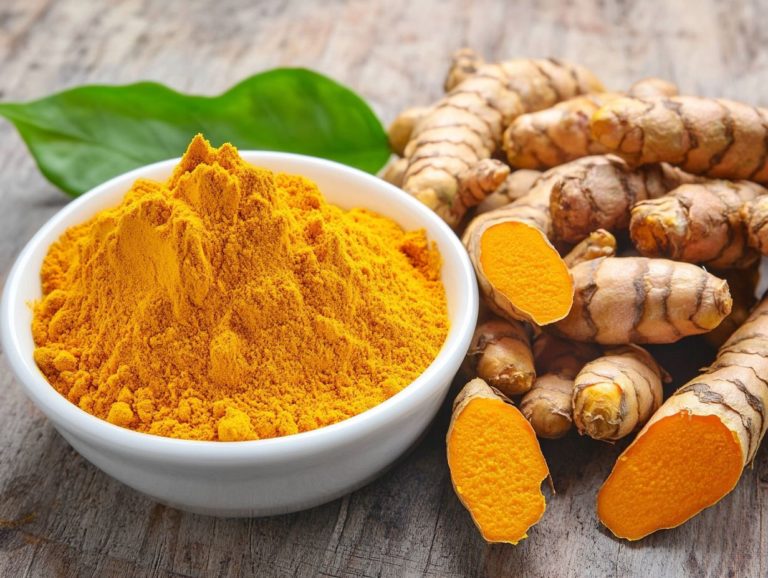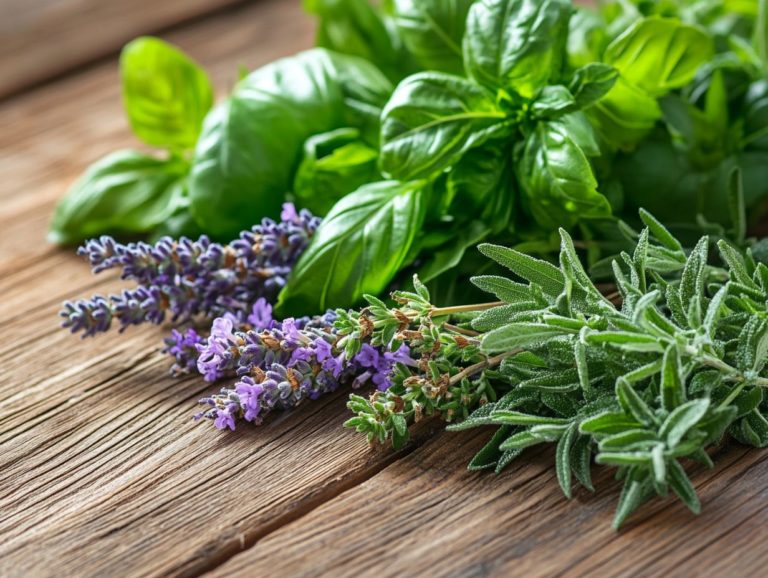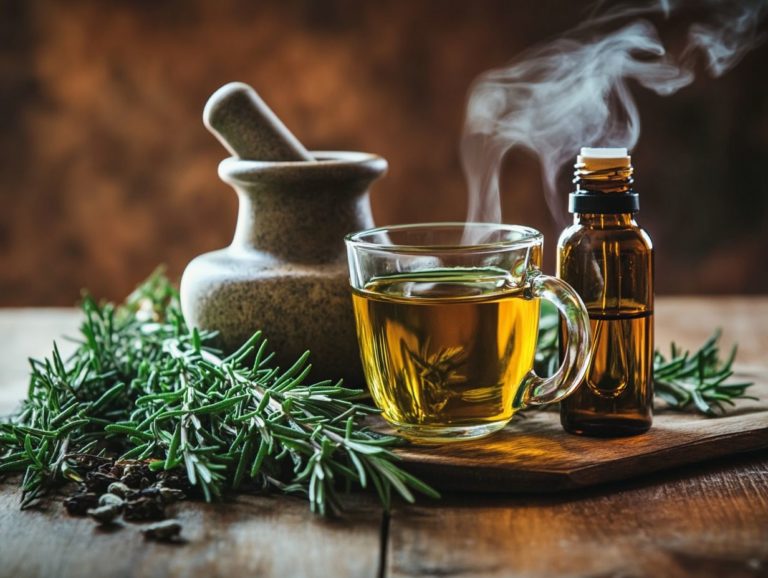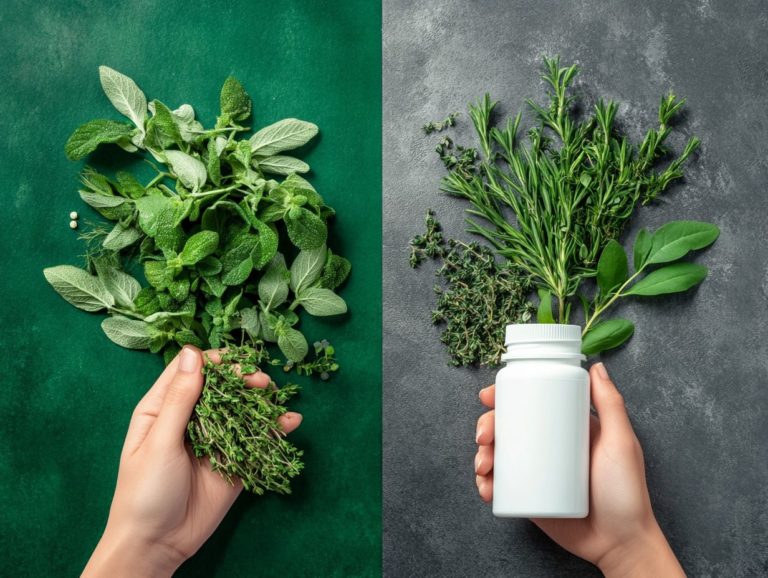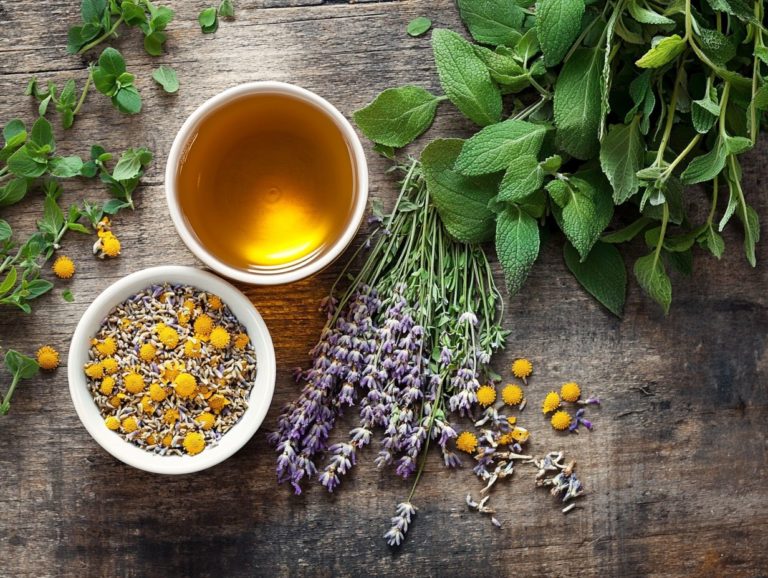Herbal Remedies for Athletes: What to Use
Herbal remedies have become increasingly popular among athletes who seek natural methods to enhance performance and aid recovery.
These age-old solutions improve endurance and speed while playing a vital role in injury prevention and pain relief.
Discover the diverse range of herbs that can help with muscle recovery, boost energy levels, and reduce inflammation.
You’ll also find valuable tips for selecting the right remedies and integrating them into your training routine for the best results.
Prepare to elevate your athletic performance to new heights!
Contents
- Key Takeaways:
- Benefits of Herbal Remedies for Athletes
- Types of Herbal Remedies for Athletes
- Choosing the Right Herbal Remedies
- Incorporating Herbal Remedies into Your Routine
- Frequently Asked Questions
- What are herbal remedies for athletes?
- Are herbal remedies safe for athletes to use?
- What are some common herbal remedies used by athletes?
- How do herbal remedies benefit athletes?
- What are the potential drawbacks of using herbal remedies for athletes?
- How should athletes incorporate herbal remedies into their routine?
Key Takeaways:
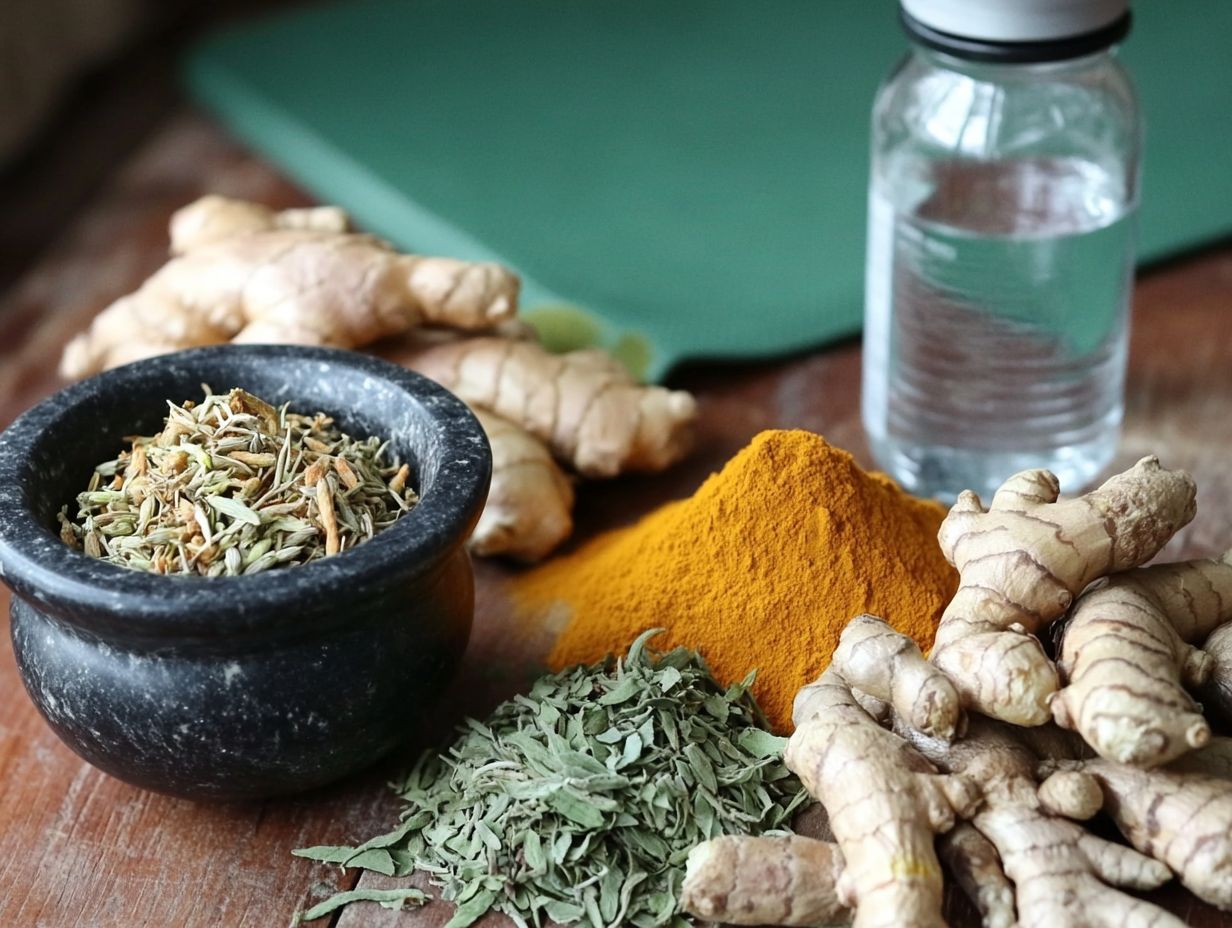
- Herbal remedies can boost performance and lower injury risk.
- Choose the right herbal treatments for muscle recovery and energy.
- Always consider your health history and allergies when selecting remedies.
What are Herbal Remedies?
Herbal remedies use plants and their extracts for healing purposes, from treating common issues like athlete s foot a pesky fungal infection to enhancing overall health. These remedies often include essential oils, like tea tree oil, along with compounds found in garlic and hydrogen peroxide, known for their ability to fight fungal infections. You can easily incorporate herbal supplements into your daily health habits, promoting wellness and preventing skin infections.
For centuries, cultures have used herbs for healing and wellness. From Traditional Chinese Medicine, which employs herbs like ginseng and ginger, to Ayurveda s rich tradition using turmeric and ashwagandha, different societies have harnessed nature s power. They documented specific herbal combinations believed to treat various ailments and boost immunity.
Modern studies are beginning to validate some of these traditional claims. Research showcases the potential of echinacea in fighting colds and the anti-inflammatory properties of willow bark. As this field evolves, herbal remedies connect us to our past while opening new avenues for understanding health in modern times.
Benefits of Herbal Remedies for Athletes
Herbal remedies offer numerous benefits for athletes, enhancing performance and aiding recovery while reducing injury risk. Incorporating these natural treatments into your routine can be invaluable.
Derived from medicinal plants, these remedies provide essential nutrients and compounds that boost physical activity, agility, and endurance key elements for peak athletic performance. Often accompanied by health claims, these remedies highlight their potential to shorten recovery times and improve overall well-being, making them a smart choice for any dedicated athlete.
Enhanced Performance and Recovery
Herbal remedies, such as tea tree oil and various herbal supplements, have caught the attention of athletes eager to improve performance and speed up recovery. The health claims surrounding these treatments emphasize their effectiveness in reducing inflammation and promoting muscle repair two crucial components for enhancing overall performance.
By incorporating these remedies into your training, you can achieve better results and increase your stamina during competitions.
Take turmeric, for example. This powerful herb contains curcumin, known for its anti-inflammatory effects. Research suggests that curcumin can significantly relieve muscle soreness and hasten recovery after tough workouts.
Ashwagandha is recognized for enhancing endurance and lowering stress levels, which supports mental focus during competition. These adaptogens help by regulating cortisol levels, fighting fatigue while promoting peak performance.
Then there s Rhodiola rosea, another adaptogen linked to better oxygen utilization in the body. This can be a game-changer for athletes, helping you achieve optimal results both in training and at events.
Explore the world of herbal remedies today and elevate your performance!
Reduced Risk of Injury
The use of herbal remedies can greatly reduce your risk of injury by promoting joint and muscle health. This is essential for sustaining peak athletic performance.
Herbal supplements often help reduce swelling and alleviate pain, allowing for a more effective training regimen. By prioritizing safety in sourcing and using these remedies, you can harness nature’s offerings without compromising your health.
Incorporating herbs like arnica, turmeric, and ginger into your routine may lead to enhanced recovery times and reduced soreness after intense workouts. For example, a professional runner shared how adding turmeric to her regimen not only eased her post-race inflammation but also improved her overall stamina.
It s important to approach herbal treatments with caution. Consulting with healthcare professionals before starting any herbal regimen is crucial to avoid potential interactions with other medications. By committing to safe practices, you can tap into the power of nature to maintain your competitive edge and overall well-being.
Types of Herbal Remedies for Athletes
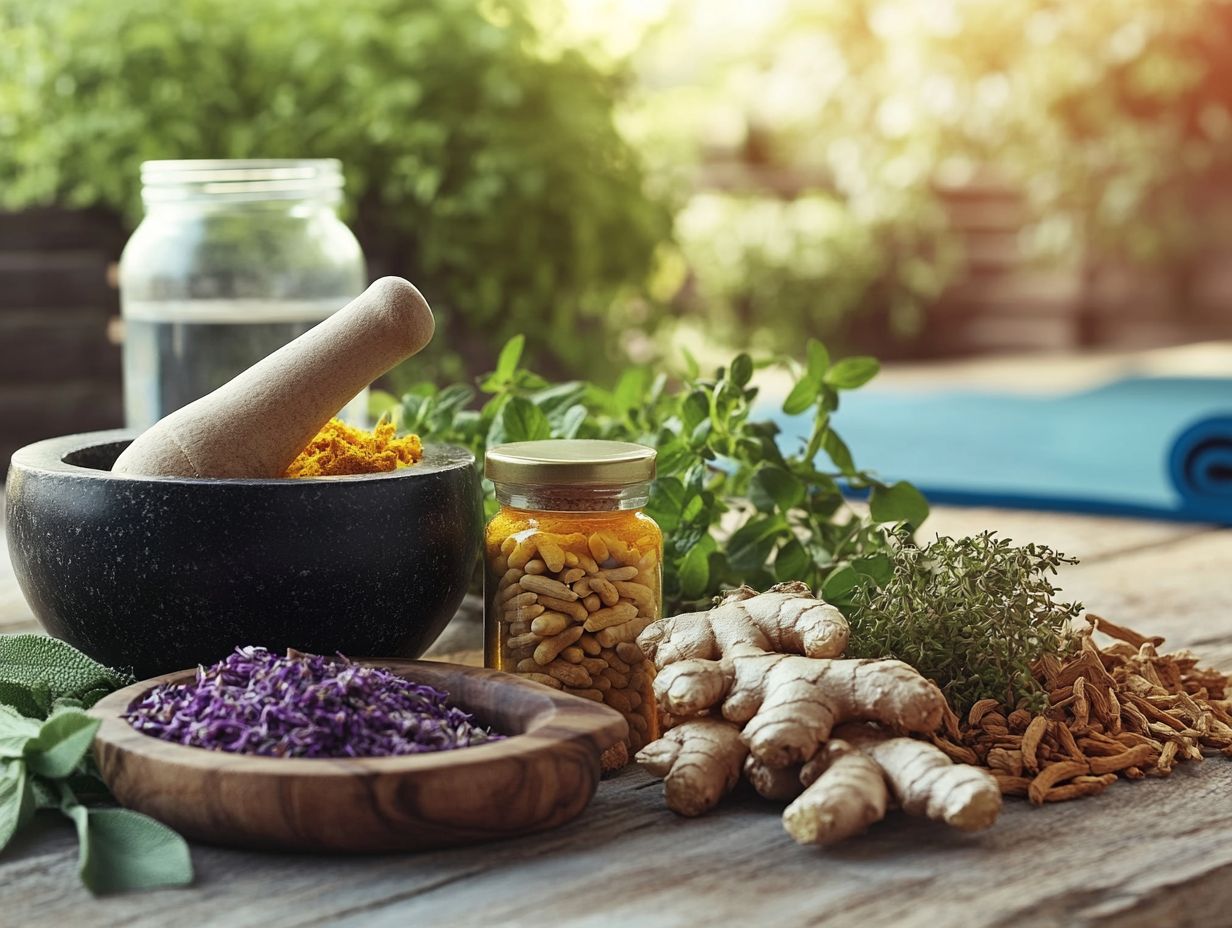
Discover a wide range of herbal remedies that can supercharge your athletic performance. Each remedy is designed to address specific needs like muscle recovery, energy enhancement, and inflammation reduction.
These herbal supplements feature an array of medicinal plants such as ginseng, Tribulus Terrestris, and green tea. Each of these herbs boasts unique properties that bolster overall athletic performance.
By understanding the different types and their applications, you can effectively tailor your health and recovery approach to suit your individual athletic journey.
Herbs for Muscle Recovery
Herbs specifically designed for muscle recovery, like ginseng and Cordyceps Sinensis, are essential for helping you bounce back after intense training sessions. These herbal remedies are highly regarded for enhancing your energy levels and promoting quicker muscle repair.
Aloe vera, known for its soothing properties, is also recognized for aiding recovery from minor injuries or strains.
Integrating these herbs into your post-workout routine can yield remarkable benefits. Ginseng contains ginsenosides that help reduce exercise-induced oxidative stress and inflammation, facilitating your recovery process.
Studies published in the Journal of Sports Science and Medicine have shown that athletes who supplement with ginseng experience less fatigue and improved endurance.
Cordyceps Sinensis boosts ATP production, providing the vital energy needed to repair damaged muscle tissues. A well-regarded study in the Journal of Ethnopharmacology highlighted its potential to enhance both exercise performance and recovery.
Aloe vera, celebrated for its anti-inflammatory properties, can be consumed as juice or applied topically to ease soreness. Together, these herbal allies work synergistically to support your muscle recovery, offering a natural alternative to commercial supplements.
Herbs for Energy and Endurance
Herbs that boost energy and endurance are essential for athletes who want to maximize their performance during competitions and training. For instance, green tea is packed with caffeine and other compounds that enhance alertness and stamina.
Then there’s ephedrine, known for its energizing effects. By utilizing these herbal remedies, you can tap into a natural alternative to synthetic energy boosters, allowing you to maintain peak performance without the downsides of over-the-counter stimulants.
Along with green tea and ephedrine, consider ginseng, a well-known herb celebrated for enhancing physical endurance and mental clarity. By stimulating your body s immune response, ginseng can help you train harder, recover faster, and keep your routines consistent.
Another powerful option is Rhodiola rosea, which many turn to for combating fatigue and improving overall stamina. This makes it particularly beneficial for endurance athletes.
As you incorporate these herbs into your daily regimen, it’s crucial to pay attention to the correct dosages and any potential interactions with medications or underlying health conditions. Consulting a healthcare provider before starting any new herbal supplement can help ensure your safety and maximize the benefits you ll gain.
Herbs for Inflammation and Pain
Herbal remedies for inflammation and pain, like turmeric and neem oil, have gained significant traction among athletes looking for natural relief. These herbs help reduce swelling and discomfort after workouts. This leads to quicker recovery times and improved performance. Hydrogen peroxide is also a valuable addition to your toolkit, showing promise in treating minor injuries and skin infections.
Take turmeric, for example; it contains curcumin, a powerful compound that blocks inflammatory pathways. It has been proven to significantly alleviate joint pain in athletes recovering from intense training sessions. In one case study featuring a marathon runner, consistent intake of turmeric supplements led to an impressive 30% drop in reported pain levels.
Likewise, neem oil also has impressive antiseptic properties, as several cyclists have testified to its effectiveness in easing soreness and swelling after long rides. These instances clearly illustrate how adding such herbs to your recovery routine can build resilience and elevate your performance through natural methods.
Choosing the Right Herbal Remedies
Choosing the right herbal remedies is vital for athletes seeking to elevate their performance and overall well-being. It s important to ensure that these remedies align with your unique needs and safety standards.
Before diving into any herbal supplements, consulting a medical professional can guide you through the overwhelming array of options, enabling you to make informed choices that seamlessly integrate into your self-care regimen.
This meticulous selection process enhances the benefits you experience and reduces the risks of using herbs incorrectly.
Factors to Consider
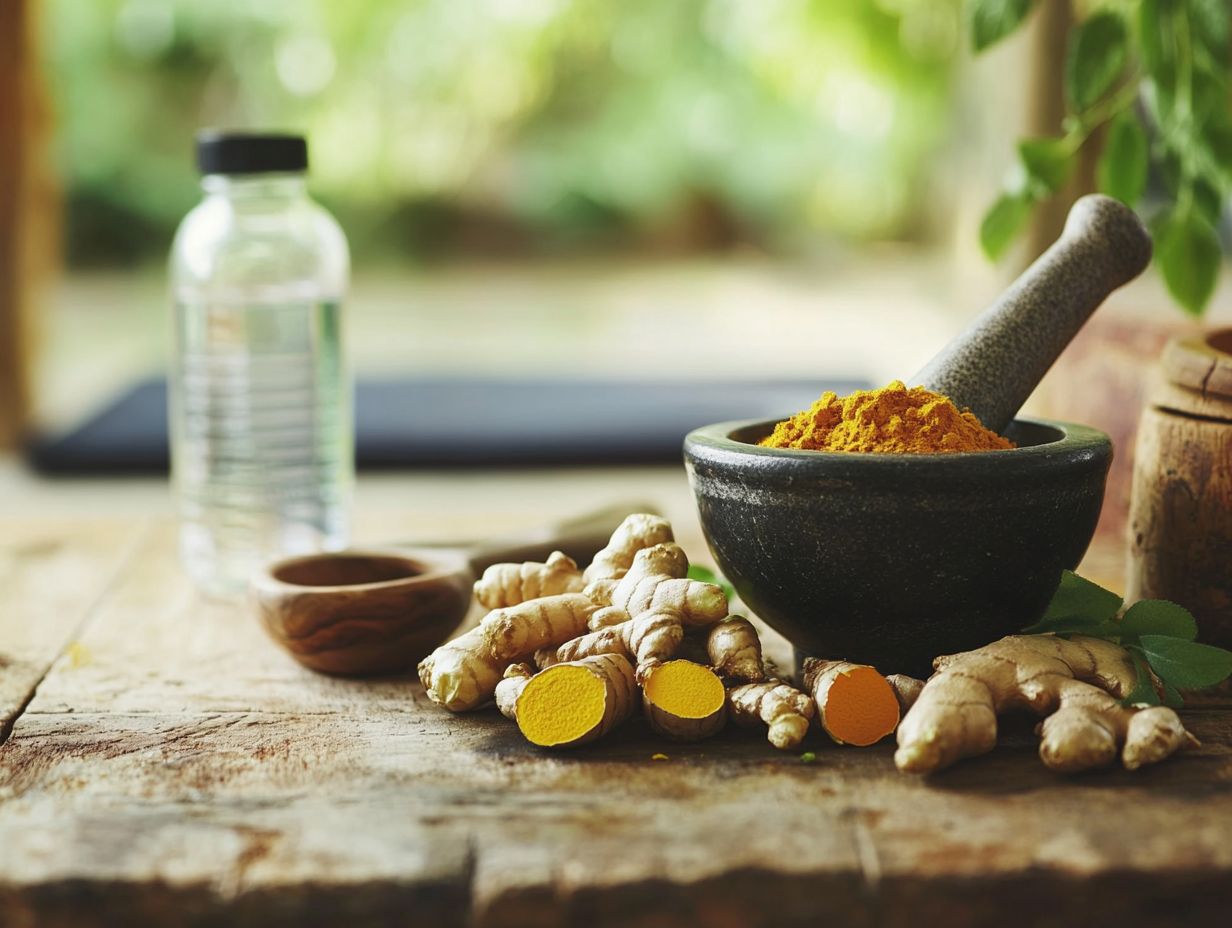
When selecting herbal remedies, you should consider various factors, including safety standards, potential allergies, and the specific health benefits you hope to achieve. Understanding the ingredients and their effects is essential, as it greatly influences the effectiveness and suitability of the remedies you choose. This is why seeking medical advice is crucial.
Adopting this holistic approach enhances your athletic performance and ensures the safe use of herbal supplements.
For instance, individual allergies can lead to adverse reactions, making it imperative for you to thoroughly research any herbal product before using it. Your lifestyle choices, such as diet and training intensity, significantly influence how your body responds to these remedies.
Choose herbs that match your performance goals. Do you want to boost endurance, improve recovery, or bolster overall wellness? Consulting healthcare professionals can offer you tailored advice, enabling a more well-considered choices process that considers your personal health history and goals.
Incorporating Herbal Remedies into Your Routine
Incorporating herbal remedies into your athletic routine demands careful planning and thoughtful consideration to truly harness their benefits while ensuring safety and effectiveness. Start with low doses and keep a close eye on any side effects.
It s essential to integrate these remedies alongside a balanced diet and a well-structured training regimen. By following this approach, you can elevate your performance and recovery while minimizing the risk of adverse reactions, ultimately achieving a harmonious balance between nature and your training efforts.
Best Practices and Tips
Adopting best practices and tips for using herbal remedies can significantly enhance your athletic performance while ensuring safe usage within your self-care routines. Key recommendations include thoroughly researching the origins and preparation methods of herbal products and adhering to safety standards. Consult with professionals to tailor your approach to your individual needs. Follow these guidelines to maximize the effectiveness of herbal remedies while minimizing risks.
Prioritize sourcing quality herbs from reputable suppliers. The strength and purity of products can vary widely. Understanding possible interactions with any prescribed medications is essential for your safety. Keeping a detailed journal to monitor your progress and note any changes in performance or well-being is highly encouraged. This practice helps you identify the most effective remedies and supports informed decisions about future use.
Collaborating with a trained herbalist can provide personalized insights and enhance how herbal remedies work well together with conventional treatments.
Watch this video to learn more about herbal remedies for athletes!
Frequently Asked Questions
What are herbal remedies for athletes?
Herbal remedies for athletes are natural substances and ingredients used to improve athletic performance, promote recovery, and prevent injuries. These remedies can come in various forms such as teas, supplements, and topical creams.
Are herbal remedies safe for athletes to use?
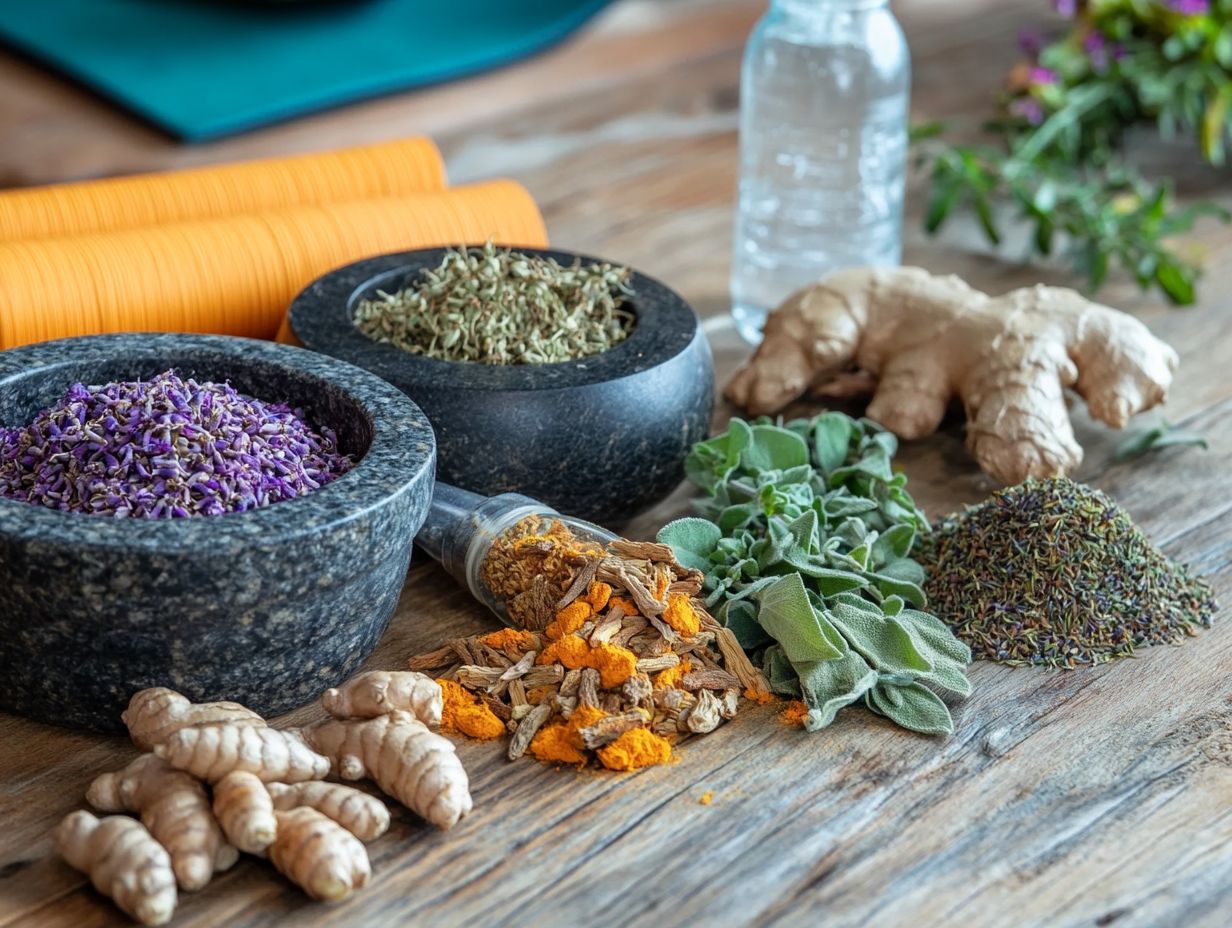
Generally, herbal remedies are safe for athletes to use. However, it is important to consult with a healthcare professional before incorporating any new herbal remedies into your routine, especially if you are taking medications or have pre-existing health conditions.
What are some common herbal remedies used by athletes?
Some common herbal remedies used by athletes include turmeric, ginger, ginseng, ashwagandha, and valerian root. These herbs have been shown to have anti-inflammatory properties, improve endurance and stamina, and aid in muscle recovery.
How do herbal remedies benefit athletes?
Herbal remedies can benefit athletes in various ways. They can help with muscle recovery, reduce inflammation and soreness, boost energy and endurance, and improve mental focus and performance. Some herbal remedies may also aid in preventing injuries.
What are the potential drawbacks of using herbal remedies for athletes?
While herbal remedies can be beneficial for athletes, there are also potential drawbacks. Some herbal remedies may interact with medications or cause side effects. It is important to do thorough research and consult with a healthcare professional before using any herbal remedies.
How should athletes incorporate herbal remedies into their routine?
Athletes should consult with a healthcare professional to determine the appropriate dosage and usage of herbal remedies based on their specific needs and health status. It is also important to purchase high-quality, reputable products and follow the recommended guidelines for use.
Ready to explore the world of herbal remedies? Start your research today!


